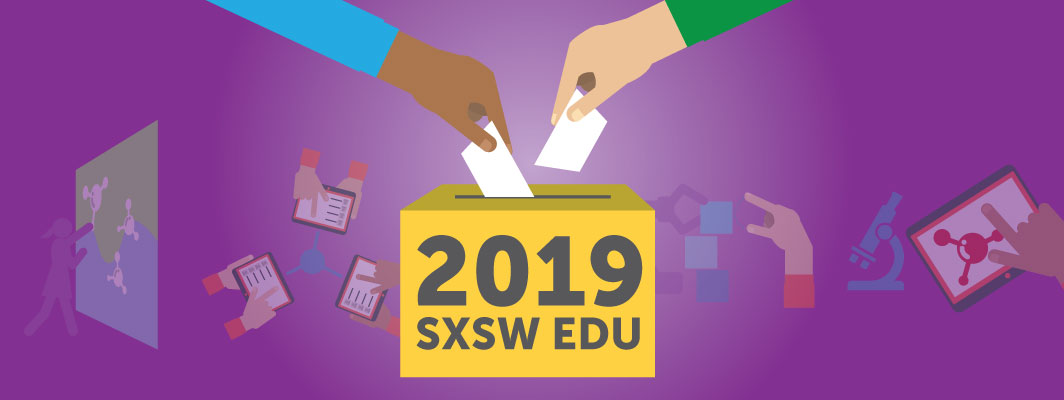
August 13, 2018 | By Erica Lawton Weinschenk
Anyone can vote for a proposed panel through SXSW’s PanelPicker process, whether you plan to attend the conference or not, once you create a free PanelPicker account.
Keep reading to check out brief summaries of our proposed panels, and click each link you’re interested in to “Vote Up” that submission, now through August 30, 2018. We hope to see you in Austin next March!
A 360° Experience on Learner Variability
The moment a teacher opens the door to their classroom at the beginning of a new school year, if they understand learner variability, they will see a design challenge, not a student challenge. This session begins by defining learner variability and launching into a 360° film called, Failure to Communicate, featuring middle school students who portray how their characters are unique learners. The film shows how, after coaching, one teacher taps the research to turn her class around.
Empowering Educator Voice through Edtech Pilots
Through Digital Promise’s evaluation capacity-building work, we have flipped the table on edtech selection and adoption by empowering those closest to learners—teachers—to ask and answer important questions about student experiences. By equipping teachers with the skills and tools needed to understand which tools work best, in which context, and for whom, classrooms will move closer to truly personalizing learning and fulfilling the promise of technology to close persistent achievement gaps.
It Takes a Village to Innovate
How do we bring school operators and community organizations together to attain critical mass and sustainable change in pursuit of equal access and opportunity for all students? This panel will explore a variety of perspectives as panelists share their work on innovation clusters that connect the private and public sectors across the country. Hear how they are advocating for increased connectedness across regions so we can all learn together faster to transform education for all children.
Keeping It Real: Experiential Learning at Scale
Schools need to provide relevant, experiential learning to all students — but have little capacity to scale. Thirteen League of Innovative Schools districts are designing a solution to scale real-world learning opportunities for all, not just a few. Learn how districts are employing a design-thinking Challenge Collaborative model to create, pilot, and scale a solution to address shared real-world learning needs within their local context. See a prototype demo of the solution!
Learner Variability: Why Research Says It Matters
Growing classroom diversity, research, sophistication of technology, & 21st-century job requirements puts us on a path to consider personalized learning. Yet, in order to do so in a way that keeps expectations high for each learner, we must first understand & address learner variability. This session will define learner variability & show through Digital Promise’s LVP, a free web app, how we make the research easily accessible for teachers and edtech developers.
Learning Sciences and Edtech: Uncovering the Facts
Have you ever heard a new research study that contradicts the study you learned about just last month? Have you ever read conclusions of a study and after all of the cautions, you have no idea if anything was learned at all? Do you wonder if we can ever truly know anything about learning? Actually, researchers know much about learning, but haven’t made the evidence-base actionable for others. In this panel, four learning scientists share the evidence and how edtech can help make it a reality.
Libraries as Maker Magnets
What happens in a Future Ready Library? Students consume less and make more! Explore why and how libraries are becoming ground zero for the maker revolution, where student are creators,empowered learners, innovative designers, and global collaborators. Learn from librarians and educational leaders how libraries engage learners with authentic STEM, computational thinking, and project-based learning.
Micro-credentials for Leadership and Learning
To keep high-performing educators in classrooms, systems must create compelling opportunities that provide true pathways to leadership. Micro-credentials—competency-based recognition for the skills educators use every day—are a promising method for implementing meaningful career pathways that empower educators and keep them engaged. District leaders who are using micro-credentials to support and expand teacher leadership through PLCs will share their successes and challenges.
Micro-learning Innovation for Macro-success
This panel will focus on how micro-lessons and micro-credentials serve to provide frontline workers access to jobs and upskilling opportunities. Using real-world case studies across industries (e.g. healthcare, hospitality, retail), panelists will deconstruct latest trends and provide evidence of effectiveness and best practices.
MY World 360-Immersive Storytelling Meets the SDGs
Recognizing the experiential storytelling potential of immersive technologies, Digital Promise Global, the United Nations SDG Action Campaign, and Oculus have launched MY World 360°, inviting youth worldwide to create 360° media as a way to share their perspectives and advance positive action toward the Sustainable Development Goals (SDGs). In this workshop, we will facilitate participants through a series of hands-on, quick start activities to spur idea development for immersive storytelling.
Revolutionizing Edtech with Interoperability
Project Unicorn, Digital Promise, and Cajon Valley USD will discuss how districts can dig deeper to develop a digital ecosystem with interoperability and discuss pain points identified by districts including privacy, security, policy compliance, and rostering. Technology will never replace great teaching. Rather, it can help educators to inform instruction, save time, and improve student outcomes. Learn how to optimize your data and mobilize your movement in the digital space.
By Dr. Kyle Dunbar and Katie Wilczak
By Elliott Barnes and Sara Mungall